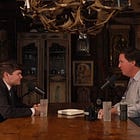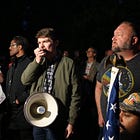What Does Nick Fuentes Think He’s Doing?
On being an insufferable contrarian.
I did Model UN a little bit in high school and always felt that there was something off about it. The real UN is, of course, hopelessly boring, so to liven up the ersatz version of it, you have to introduce a few rogue elements—you need a dose of fanaticism (I remember our team trying to claim that Suriname, which we represented, was majorly invested in trying to curb genocide in Darfur) and you have to be a bit opportunistic: you’re being taught the lawyerly skills of being able to argue any position, no matter how noxious, with equal conviction. And then at the upper levels of Model UN, a bit of backstabbing helps as well—the real art to a conference is to develop a coalition and then to sell out that coalition so you get all the credit.
Yes, there definitely is a dark side to Model UN, but it didn’t seem like that big of a deal until the delegate from hell, Nick Fuentes, showed up in the national discourse and seemed to take the whole country in a new, and much twerpier, direction.
In an interview on Patrick Bet-David’s podcast PBD, Fuentes made it clear that this pretty much exactly is his origin story. He was more or less fully formed as an annoying right-wing contrarian by the time he got to high school and had his insufferability down pat—“When I was in Model UN, I was one of the best guys on the team, I would win first place every week,” Fuentes recalled. But the Model UN club faculty advisor gave him John Mearsheimer and Stephen Walt’s The Israel Lobby and U.S. Foreign Policy to read and that gave young delegate Fuentes a new and exciting element to add to his right-wing portfolio beyond just the usual diet of Breitbart News and Prager University.
And, like any debater finding a master theory of the case, Fuentes was quick to realize what he had in his hands. As a way to be provocative, anti-Semitism is hard to beat, and—as anti-Semites have realized for a long, long time—anti-Semitism has a cozy way of explaining just about everything. By the time the terrible child had reached college, he was carving out an anti-Semitic niche for himself within the alt-right movement—which led to his ostracism from leaders of the movement—but with his interview with Tucker Carlson in October, this new brand of anti-Semitism, workshopped for years on Fuentes’ “America First” show, seemed to jump the gate and enter the mainstream.
If we try to understand Fuentes and what he represents, this seems to be the place to start, even if the white nationalist sentiments are maybe baked in a layer deeper. In the same PBD interview, here is how he explained it: “It’s important to impress upon you and maybe everybody where I grew up. It’s like this pocket of America that never changed. It’s a baseball town. Everybody’s white. Everybody’s obsessed with baseball … Take a trip down to Western Springs, Illinois, you’ll see what I mean. It’s like the land that time forgot.”
But Fuentes seemed to quickly recognize that an advocacy of baseball would only take him so far, and, once he’d hit on praising Hitler and discussing world Jewry—and breaking the cordon sanitaire that American politics as a whole had towards anti-Semitism—then the sky was the limit as far as provocation was concerned. And there really was very little, it turned out, that couldn’t be explained through anti-Semitism. On his show, he argued that JFK was killed because he had opposed Israel’s nuclear weapons program—or maybe it was that JFK was killed because he had tried to get the American Israel Public Affairs Committee (AIPAC) to register as a foreign agent, or maybe it was both, but, anyway, it was pretty definitely the Jews. “So this is an occupied nation,” Fuentes continued, describing the United States as “a vassal of Israel.”
It is a note that we haven’t heard on a mass scale in American politics in quite some time, but it’s also not a new story—“it’s maybe old ideas presented in a new way,” as Fuentes said on PBD. And to put the right lens on Fuentes it may be worth doing a short refresher on modern anti-Semitism.
Historians tend to divide anti-Semitism into different parts. There’s a hoary old tradition of Christian anti-Semitism with blood libels and Christian children baked into matzah mix and a pogrom whenever things got a little slow in your village, and that sort of thing. By the late 19th century, the “Jewish Question” that had so bedeviled earlier generations seemed to have resolved itself—Jews had full citizenship in all German states by 1871 and Christian anti-Semitism seemed to be on the wane, together with a general decline in religiosity. At which point an entirely new anti-Semitism suddenly sprouted up. Wilhelm Marr, “the patriarch of anti-Semitism,” published The Victory of Judaism Over Germandom in 1879 and founded The League of Anti-Semites the same year, with a doctrine of blood-based “anti-Semitism” replacing the earlier religion-based “anti-Judaism.” Marr himself at the end of his life would distance himself from anti-Semitism and conclude that, really, it was the greater force of the Industrial Revolution that had generated social upheaval in Germany. And that’s been the general academic understanding of what the new anti-Semitism really entailed—it was a disgruntlement with modernity and with cosmopolitanism, with Jews serving as a scapegoat.
The English writer Hilaire Belloc, no mean anti-Semite himself, would observe at a quieter moment, “the European so misunderstands the Jew that he imputes to him powers which neither he nor any other poor mortal can ever exercise.” But in the heat of politics it was often hard to remember that. The changes of modernity were so sweeping that it helped to reduce the scale of it by bringing things down to a more manageable cast of the Rothschilds and Syndicate and the Elders of Zion.
The sense of crisis that beset rapidly-industrializing nations in the 19th century has its parallels in our time. The longing for agriculture seems to have been replaced by nostalgia for baseball and barbecue in a small town. The understanding is that a solidly American way of life has been sold out by globalism—by foreign wars, foreign investments, and ever-escalating national debt. In another video, a rant against Ben Shapiro, Fuentes laid out his general complaint in a way that, I suspect, resonated with some enormous number of listeners: “Our country is broke. Our future is mortgaged. We’re debt slaves to the government and Black Rock.” If Trump built his movement around a rejection of outsourcing and the deindustrialization of the heartland, he never entirely spelled out who was responsible. Fuentes, however, does—and it’s a familiar formula. It’s the bankers, and the bankers are Jewish. And to that, he adds a new element. The anti-Semites of an earlier era didn’t have Israel to kick around, but Fuentes does. Here, for instance, is his theory of how the Iraq War came about:
Because [Kennedy] tried to make sure that Israel just like all the other countries did not nuclearize because we’re against the proliferation of nuclear weapons and they killed him for it. And that set in motion something that eventually led to 9/11, the biggest attack on our soil in history, and then that set in motion the biggest strategic disaster in the history of the United States, which is the Iraq War and the Global War on Terror and the present situation we find ourselves in in the Middle East. Are you starting to get it now?
How well it all fits together! How many factors—corporate pursuit of profits, bipartisan excitement about new markets in the ‘90s, warmongering generated largely by the Republican Party after 9/11—fade out of the equation, and all that’s left to explain fifty years of economic and foreign policy is Israel, AIPAC, the cunning Jews, and the simple baseball-loving volk of the Chicago suburbs being led along as if on a string.
But to get to this time-honored position, you have to get around a certain national consensus—in a word, you have to get around V-E Day and the last real moment of national unity, which happened to be an international war fought and won against the worst-ever enemy of the Jews. It’s a real obstacle, and when Trump dreams of “making America great again” he often seems to be dreaming explicitly of this time—Bannon brought close to tears whenever he watches 12 O’Clock High, Trump looking to surround himself with the “central casting” version of a mid-20th century style national security apparatus.
But Fuentes has been willing to work past all of this. His strategy here is to studiously downplay the importance of Nazism. The “Hitler apologetic” clips of Fuentes are what have gotten the most play around the web, so it can be a little hard to follow how his understanding of Nazism fits into his overall scheme. Here is how he puts it in one of his videos: “To the extent that we make jokes about Hitler … it is basically to treat this in a sacrilegious way, it is to blaspheme this religion, it is to destroy the sacred cow, the idol of the Holocaust.”
In other words: “shut up Jews.” The argument—and this hearkens back to the pre-war “genteel anti-Semitism” that had a way of overlooking or excusing Hitler’s racial laws—is that the Holocaust is a glorified form of victimhood politics. As Fuentes explicitly puts it, “I’m trying to get to a point where Hitler is like every other leader.” And Fuentes would very much like to replace that point of mid-20th century anti-Nazi unity with something different—a “heritage conservatism” that reaches back to 19th century nativist strains and that views all immigration as an assault on an ethnicity-based national identity. If that makes it sound like Jewishness is incidental to Fuentes’ vision, though, it’s not—and a great deal of airtime on his show is taken up with his pushing back against right-wing critics who want him to tone down his anti-Semitism. “‘Hey well, we’re gonna moderate on the Hitler stuff, right?’ he imagines an interlocutor saying to him, to which Fuentes responds, “and it’s like no, I’m not.’” It really is important for him to get around the nostalgia for the post-World War II consensus and to substitute a vision from a much earlier era of a white ethnostate.
This, certainly, is confusing to other conservatives, and there was a kind of eye-popping moment during the Carlson interview, which played out pretty much exactly like the church pastor inviting a misbehaving youth into his office expecting to find common ground in Christ’s love only to discover that the lad really had sold his soul to the devil. For professional reasons both Fuentes and Carlson had a great deal at stake in making the interview as genial as possible, and much of it had a kind of bachelorette party feel of forgiving past slights (“I thought you were a Fed!” / “I thought you were a Fed!”) until they stumbled over the real crux of their disagreement. “God created every person as an individual not as a group. No woman gave birth to a community. We hate that thinking, right? Collectivist thinking like that. That’s identity politics. … But we’re not going to be that, right or no?” said Carlson, who, over the course of his many career turns, maybe had lost track of what he actually stood for. Fuentes, though, was quick to set him straight. “You say identity politics like it’s a bad thing. I think identity is a reality.”
In their eagerness to be friendly, Carlson and Fuentes tried once again to strenuously agree with each other, but they had come across maybe the deepest divide of all—the question of how moral responsibility is assessed—and, coincidentally or not, it echoed the deep divide within 19th century anti-Semitism. For Carlson, steeped in a Judeo-Christian tradition, morality is ultimately individual and a matter of one’s actions. For Fuentes, it is identitarian and a question in the end of blood—a person could act in certain ways based only on their heredity. A divide much along these lines became particularly poisonous when the old Christian anti-Semitism, which emphasized conversion for Jews, gave way to another blood-based form of anti-Semitism where even conversion to Christianity couldn’t obviate the fundamental stain. For historians of anti-Semitism, it was that ultra-nationalist view that represented a truly virulent turn in anti-Semitism’s history, and in our time we have been treated to seeing it articulated right under the eyes of the befuddled Carlson.
There is much blame to go around for this dark turn in the discourse. Attempts to censor Fuentes—he has been kicked off just about every possible social media platform and at one point was on a TSA no-fly list—seem not to have worked and succeeded only in making him something of a martyr. The bro-ish, edgelord tendencies of the internet have given cover, through various forms of threadbare irony, to his toxic ideology. The left takes the lion’s share of the blame for bringing identity into the forefront of political discourse, along with its evident implication that groups are to blame for the actions of anyone in their group and that guilt can never entirely be washed away. And then people like Carlson guilelessly bring the abhorrent ideology closer to the mainstream and in so doing launder it for mass consumption.
And now here we are. Whatever else we might have disagreed on in our politics, it used to be that we could agree on this: Hitler bad; Holocaust bad; defeating Hitler good. Now, lots of people aren’t so sure. Populists and demagogues have throughout history discovered the explanatory power of anti-Semitism, and now the world’s worst Model UNer has as well, and in almost exactly the same form that Wilhelm Marr stumbled across back in 1880. The usual question with Fuentes—of whether he’s sincere in his anti-Semitism, or basically kidding—doesn’t matter. Anti-Semitism tends always to be an opportunistic mode of thought—like a favorite hat that can be taken off and put back on but that is always deployable when some really tidy explanation is called for for some vexing societal problem. Cognizant of where it can lead to, the West, with startling unanimity, has imposed a kind of public moratorium on anti-Semitism for the last 75 years, but the cynical will sooner or later find their way to it, as Fuentes did somewhere in the doldrums of some high school Model UN conference and then spent the next decade milking it for all it was worth. It really was nice to have a break from this particular strand of politics for as long as we did, but no longer. In a major way, anti-Semitism has reentered our discourse and, now, all bets are off.
Sam Kahn is associate editor at Persuasion and writes the Substack Castalia.
Follow Persuasion on X, Instagram, LinkedIn, and YouTube to keep up with our latest articles, podcasts, and events, as well as updates from excellent writers across our network.
And, to receive pieces like this in your inbox and support our work, subscribe below:






Once Churchill as a warmonger instead of a savior of Western civilization becomes a plausible interpretation of history, then any version of alternate history becomes acceptable for public discussion.
We long for the gate-keepers: the editors, fact checkers, peer review committees, Party elders, bishops, the imprimatur of certain publishing houses.... But when does that paraphernalia coalesce into mass conformity? The see-sawing can be disconcerting over time: in the 50s we were smothered by "all the houses made of ticky tacky" only to give way to the 60s of dizzying numbers of 'Parties' and then the collapse into the 70s and then along came Reagan and Gingrich, etc. Clawing our way back to a balance between gate-keepers and gate-crashers will be our task if ever we are allowed to commence it. Good luck, all you youngsters.